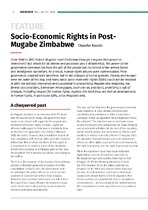Socio-economic rights in post-Mugabe Zimbabwe
| dc.contributor.author | Kondo, Tinashe | |
| dc.date.accessioned | 2018-10-22T07:43:04Z | |
| dc.date.available | 2018-10-22T07:43:04Z | |
| dc.date.issued | 2018 | |
| dc.identifier.citation | Kondo, T. (2018). Socio-economic rights in post-Mugabe Zimbabwe. ESR Review, 19(2): 2-5. | en_US |
| dc.identifier.issn | 1684-260X | |
| dc.identifier.uri | https://hdl.handle.net/10520/EJC-11739dc733 | |
| dc.identifier.uri | http://hdl.handle.net/10566/4146 | |
| dc.description.abstract | From 1980 to 2017, Robert Mugabe ruled Zimbabwe through a regime that posed as ‘democratic’ but which for all intents and purposes was a dictatorship. The power of the government stemmed not from the will of the people but its control of the armed forces and intelligence operatives. As a result, human rights abuses were commonplace. Poor governance, coupled with sanctions, led to the collapse of social systems. Poverty and hunger were the order of the day, and many basic socio-economic rights (SERs) could not be realised. In 2017, the military intervened and succeeded in pressurising Mugabe into resigning. His former vice president, Emmerson Mnangagwa, took over as president, promising a raft of changes, including respect for human rights. Against this backdrop, we look at developments in human rights, in particular SERs, since Mugabe’s exit. | en_US |
| dc.language.iso | en | en_US |
| dc.publisher | Dullah Omar Institute | en_US |
| dc.rights | ESR Review : Economic and Social Rights in South Africa is an Open Access journal | |
| dc.subject | Robert Mugabe | en_US |
| dc.subject | Zimbabwe | en_US |
| dc.subject | Human rights abuses | en_US |
| dc.subject | Dictatorship | en_US |
| dc.subject | Socio-economic rights (SERs) | en_US |
| dc.title | Socio-economic rights in post-Mugabe Zimbabwe | en_US |
| dc.type | Article | en_US |
| dc.privacy.showsubmitter | FALSE | |
| dc.status.ispeerreviewed | TRUE |

